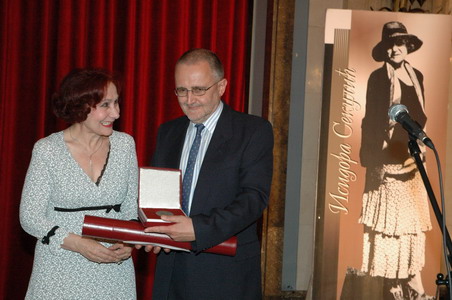Last night, I was honored with the 2006 Isidora Sekulic Award for my mosaic novel The Bridge. The award, named after one of the greatest Serbian female writers and essayists of the 20th century, is a major mainstream literary prize chosen by a majority vote of jury members. It comes with €2,500, or about US$3,300.
A brief speech by Prof. Slobodan Grubacic, president of the award jury, announcing the award at a ceremony at Belgrade City Hall:
The Isidora Sekulic Award for 2006 has been presented to Zoran Zivkovic for his novel The Bridge. The decision was made by majority vote of jury members.
It is not easy to interpret the work of an author who knows so much about life that he could write an encyclopedia of the living and the dead, and who knows absolutely everything about art – so much that he could easily devote his books to the supra-conceptual reconciliation of conscious and unconscious states. Nevertheless, although Zivkovic follows the principles of storytelling honed from his previous books, here the prose he offers is not full of introspection and deep internal enlightenment. He does not place his stories in astral regions, in places of an inaccessible metaphysical reality. On the contrary, he finds the fantastic of everyday events to be a highly powerful tool with which to produce unusual literary work. Furthermore, at a time in which the anecdote is easily transformed into a cosmic event, and a cosmic event into an anecdote, the fantastic has proven to be an element that successfully transports the everyday prose of events into the poetry of literature.
This principle is not forsaken in the awarded The Bridge, either. Themes of doubles, raincoats, meeting on a bridge – with us from Hoffman to Gogol and from Hofmanstal to Kafka – eloquently indicate Zivkovic’s dexterity at playing with familiar and less known themes in world literature, of which the most powerful is anagnoresis, the ancient motif of recognition. A master of brevity, the author of The Bridge uses it almost according to Aristotle: the symbols, the memories, the conclusions that are made, whether accurate or not. Illusory simplicity conceals the clusters of a perfect composition in which characters constantly examine their human essence, living their losses as their sole, inalienable possession.
Every culture wants to have a writer like Zoran Zivkovic.







